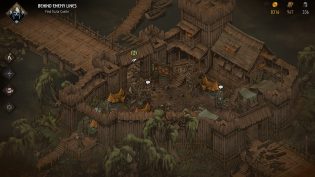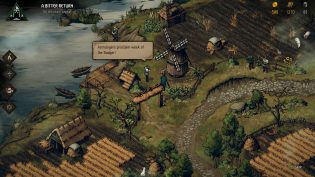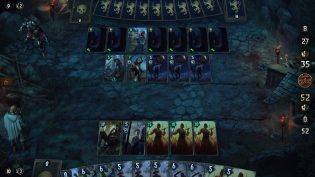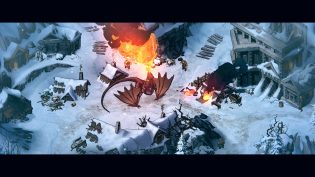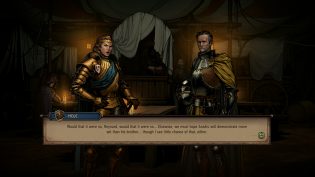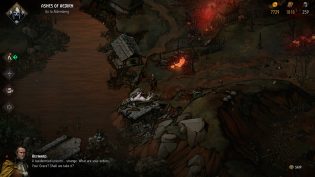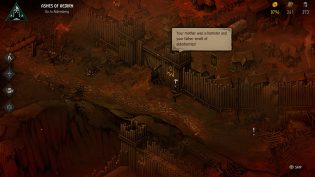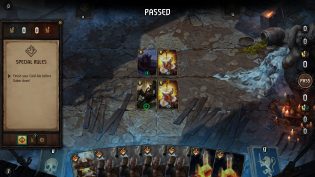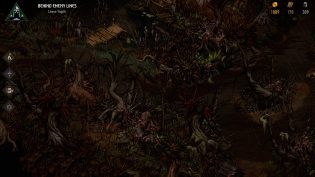Unlike so many people, I wasn’t really into Gwent (or, Gwint, as it’s originally known in Polish) when playing The Witcher 3. So I was completely uninterested in a standalone multiplayer focused free to play game when it was launched and has never even tried playing it since. Imagine my surprise when CD Projekt RED decided to make a story-driven title with Gwent as its central mechanic. I wasn’t looking forward to play it, yet couldn’t resist another story-based visit to the world of The Witcher, which I do like. And… it’s fine.
At the most basic level, the way Thronebreaker works can be compared to a mix of Heroes of Might & Magic (or King’s Bounty) with The Banner Saga, a fact that gets called out in an (obnoxiously) self aware joke at one point. You run around a map, gathering resources and fighting enemies, usually visible on the map, just like you would in the former, but the camping and story-based choice-consequence sequences are very heavily based on the latter. Except instead of a turn based combat you have a card game battle or puzzle. Both of which barely resemble the rules of Gwent in The Witcher 3.
Now, I don’t particularly enjoy card games. In fact, I don’t like them at all, unless they’re a little optional mini-game in an otherwise different genre game. So maybe I’m not the best person to tell whenever the rules of the game in Thronebreaker are good or not, but I did not enjoy them. What worked in the version of Gwent from TW3 was how easy to understand it was. Which was done most likely due to it being a mini-game in a complex story-driven RPG. Becoming the main focus, the main mechanic, required changes and I can understand that. But I don’t understand why said changes got this confusing and complex. Whenever I tried to look at this as using units in a turn-based strategy (another genre I’m not that great at), or a simplistic card game as TW3 Gwent, it never really “clicked” with me. And the puzzle encounters weren’t much more fun either, often requiring just failing a lot until you learn one possible sequence of things to do or sometimes just being pointlessly easy. Due to all that, about halfway through the game I just switched to an easier difficulty and skipped most of the remaining fights in the game with no regrets.
Mostly due to the fact that apart from the card mechanics, there’s a pretty solid story that has almost no connection to the card battles whatsoever. And unlike The Banner Saga, where it’s sometimes really weird how character combat skills or wounds have no influence on the story sequences at all and vice versa, in Thronebreaker the game doesn’t even try to create a false connection between the story mode and the cards mode. So you can safely skip the battles and enjoy the story and the map exploration and watch the character relationships evolve and consequences to your choices manifest.
Not that Thronebreaker has a particularly amazing story, though. It’s solid, I enjoyed it and it added a nice different angle to the Second Nilfgaard War that has been a background element of most of The Witcher novels. And it does feature an episode that you would expect to find if you’ve read said books. Though, I don’t think that it, as short as it is, excuses putting Geralt everywhere on the PR materials for this game. Either way, it’s an enjoyable story with lots of good moments, choices that feel meaningful and questions without a right or wrong answer.
Can I recommend Thronebreaker? If you really like Gwent, as it is in the free to play game, you probably already played it. If you’re a fan of The Witcher everything then, even if you dislike card games, you will enjoy another trip into this world and will be able to choose the easiest difficulty to skip battles. If you like The Witcher casually, but don’t care much about world building, or anything but the stories of Geralt or Ciri you won’t find anything here unless you’re interested in card games. Personally, I liked the game enough, but highly doubt I will ever play it again.


